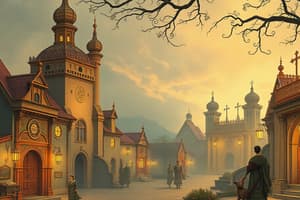Podcast
Questions and Answers
What is the primary focus of social history?
What is the primary focus of social history?
- The examination of government systems and state formation.
- The experiences and lifestyles of ordinary people. (correct)
- The analysis of economic activities and labor systems.
- The study of artistic and philosophical developments.
Which period is characterized by the emergence of writing and organized states?
Which period is characterized by the emergence of writing and organized states?
- Early Modern History
- Ancient History (correct)
- Prehistory
- Medieval History
What is the study of how history is written and interpreted over time called?
What is the study of how history is written and interpreted over time called?
- Primary Sources
- Historiography (correct)
- Cultural History
- Political History
What major theme in history focuses on trade, taxation, and economic activities?
What major theme in history focuses on trade, taxation, and economic activities?
Which historian is known as the 'Father of History'?
Which historian is known as the 'Father of History'?
During which period did the Industrial Revolution occur?
During which period did the Industrial Revolution occur?
What does the term 'primary sources' refer to in historical studies?
What does the term 'primary sources' refer to in historical studies?
Which of the following was a significant result of the Medieval period?
Which of the following was a significant result of the Medieval period?
Flashcards are hidden until you start studying
Study Notes
Key Concepts in History
-
Definition of History: The study of past events, particularly concerning human affairs.
-
Importance of History:
- Provides insight into how societies have evolved.
- Helps understand cultural, political, and social changes.
- Offers lessons learned that can inform present and future decisions.
Major Periods in History
-
Prehistory:
- Before written records; includes the Stone Age, Bronze Age, Iron Age.
- Development of tools, agriculture, and early human societies.
-
Ancient History (c. 3000 BCE - 500 CE):
- Emergence of writing, cities, and organized states (e.g., Mesopotamia, Egypt, Indus Valley).
- Major civilizations: Greeks and Romans.
-
Medieval History (c. 500 - 1500 CE):
- Feudalism, rise of kings and empires (e.g., Byzantine Empire, Holy Roman Empire).
- Effects of the church, the Crusades, and the Black Death.
-
Early Modern History (c. 1500 - 1800 CE):
- Renaissance, Reformation, and Age of Exploration.
- Development of nation-states, colonialism.
-
Modern History (c. 1800 - present):
- Industrial Revolution, World Wars, Cold War era.
- Civil rights movements and globalization.
Key Historical Themes
-
Political History:
- The study of governments, political practices, revolutions, and state formation.
-
Social History:
- Focus on the experiences, activities, and lifestyles of ordinary people.
-
Economic History:
- Examination of economic activities, trade, taxation, and labor systems throughout time.
-
Cultural History:
- Analysis of artistic, religious, and philosophical developments and their impact on society.
Historical Methods
-
Primary Sources:
- Original documents or artifacts from the historical period being studied (e.g., diaries, letters, official records).
-
Secondary Sources:
- Interpretations or analyses based on primary sources (e.g., books, articles).
-
Historiography:
- The study of how history is written and interpreted over time, influencing historical narratives.
Notable Historians
-
Herodotus: Often regarded as the "Father of History" for his work on the Greco-Persian Wars.
-
Thucydides: Known for his account of the Peloponnesian War, emphasizing evidence and analysis.
-
Edward Gibbon: Famous for "The History of the Decline and Fall of the Roman Empire."
Tips for Studying History
- Focus on timelines for understanding chronological sequences.
- Create mind maps to connect themes and significant events.
- Engage with multiple perspectives to grasp nuanced interpretations.
- Practice critical thinking by analyzing cause-and-effect relationships in historical events.
Definition of History
- The study of past events, especially those related to human affairs.
Importance of History
- Provides insight into how societies have evolved.
- Helps understand cultural, political, and social changes.
- Offers lessons learned that can inform current and future decisions.
Major Periods in History
- Prehistory: Before written records, including the Stone Age, Bronze Age, and Iron Age.
- Development of tools, agriculture, and early human societies.
- Ancient History (c. 3000 BCE - 500 CE): Emergence of writing, cities, and organized states (e.g., Mesopotamia, Egypt, Indus Valley).
- Major civilizations: Greeks and Romans.
- Medieval History (c. 500 - 1500 CE): Feudalism, rise of kings and empires (e.g., Byzantine Empire, Holy Roman Empire).
- Influence of the church, the Crusades, and the Black Death.
- Early Modern History (c. 1500 - 1800 CE): Renaissance, Reformation, and Age of Exploration.
- Development of nation-states, colonialism.
- Modern History (c. 1800 - present):
- Industrial Revolution, World Wars, Cold War era.
- Civil rights movements and globalization.
Key Historical Themes
- Political History: Focuses on governments, political practices, revolutions, and state formation.
- Social History: Explores the experiences, activities, and lifestyles of ordinary people.
- Economic History: Examines economic activities, trade, taxation, and labor systems throughout history.
- Cultural History: Analyzes artistic, religious, and philosophical developments and their impact on society.
Historical Methods
- Primary Sources: Original documents or artifacts from the historical period being studied (e.g., diaries, letters, official records).
- Secondary Sources: Interpretations or analyses based on primary sources (e.g., books, articles).
- Historiography: The study of how history is written and interpreted over time influencing historical narratives.
Notable Historians
- Herodotus: Known as the "Father of History" for his work on the Greco-Persian Wars.
- Thucydides: Famous for his account of the Peloponnesian War, emphasizing evidence and analysis.
- Edward Gibbon: Known for "The History of the Decline and Fall of the Roman Empire".
Tips for Studying History
- Focus on timelines to understand chronological sequences.
- Create mind maps to connect themes and significant events.
- Engage with multiple perspectives to grasp nuanced interpretations.
- Practice critical thinking by analyzing cause-and-effect relationships in historical events.
Studying That Suits You
Use AI to generate personalized quizzes and flashcards to suit your learning preferences.




